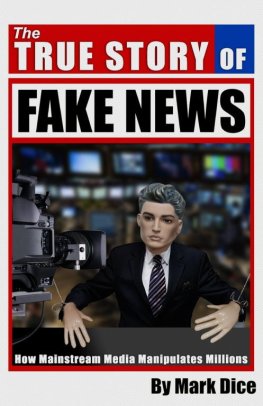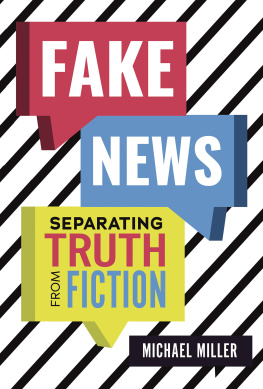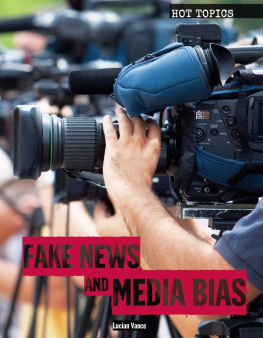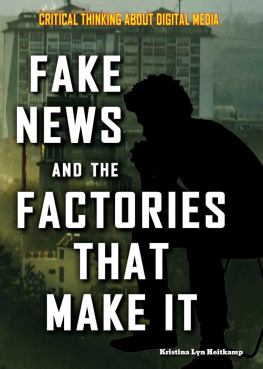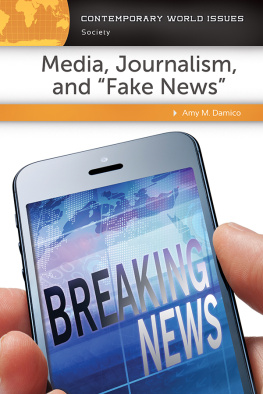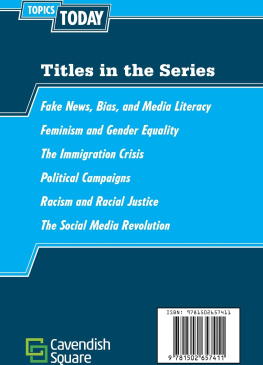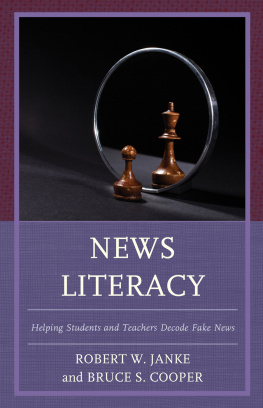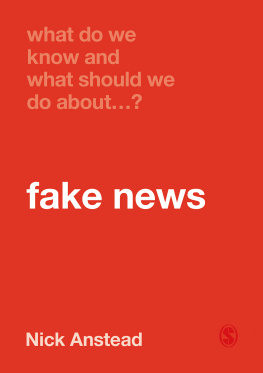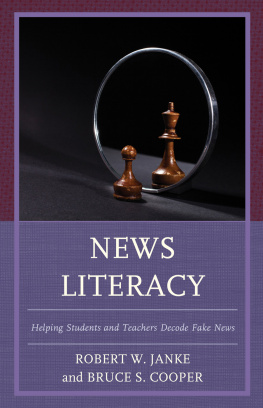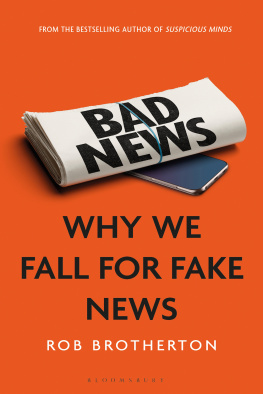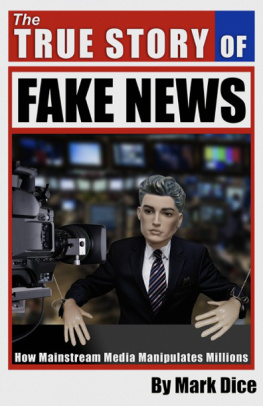Fake News
Fake News: Falsehood, Fabrication and Fantasy in Journalism examines the causes and consequences of the fake news phenomenon now sweeping the worlds media and political debates. Drawing on three decades of research and writing on journalism and news media, leading scholar Brian McNair engages with the fake news phenomenon in accessible, insightful language designed to bring clarity and context to a complex and fast-moving debate.
McNair presents fake news not as a cultural issue in isolation but rather as arising from, and contributing to, significant political and social trends in twenty-first-century societies. Chapters identify the factors which have laid the groundwork for fake news explosive appearance at this moment in our globalised public sphere. These include the rise of relativism and the crisis of objectivity, the role of digital media platforms in the production and consumption of news and the growing drive to produce online content which attracts users and generates revenue. The book also considers the decline of trust in journalism and how the traditional left critique of dominant ideology and ruling elites in media has been appropriated by the alt-right, nationalists and populists all over the world.
This book rejects the leftright division in discussion of what is and is not fake news. Rather, it aims to provide students, teachers, journalists and general readers with the tools necessary to navigate the digital journalism landscape in the era of President Donald Trump and to filter out the fact from the fake in their news.
Brian McNair is Professor of Journalism, Media and Communication at Queensland University of Technology. He is the author of fifteen books, including Communication and Political Crisis (2016), Cultural Chaos (2006), Journalists in Film (2010) and Politics, Media and Democracy in Australia (with Flew et al., 2017).
Disruptions: Studies in Digital Journalism
Series editor: Bob Franklin
Disruptions refers to the radical changes provoked by the affordances of digital technologies that occur at a pace and on a scale that disrupts settled understandings and traditional ways of creating value, interacting and communicating both socially and professionally. The consequences for digital journalism involve far-reaching changes to business models, professional practices, roles, ethics, products and even challenges to the accepted definitions and understandings of journalism. For Digital Journalism Studies, the field of academic inquiry which explores and examines digital journalism, disruption results in paradigmatic and tectonic shifts in scholarly concerns and prompts reconsideration of research methods, theoretical analyses and responses (oppositional and consensual) to such changes, which have been described as being akin to a moment of mind blowing uncertainty.
Routledges new book series, Disruptions: Studies in Digital Journalism, seeks to capture, examine and analyse these moments of exciting and explosive professional and scholarly innovation which characterize developments in the day-to-day practice of journalism in an age of digital media and which are articulated in the newly emerging academic discipline of Digital Journalism Studies.
Hyperlocal Journalism and Digital Disruptions
Scott Downman and Richard Murray
Fake News
Falsehood, Fabrication and Fantasy in Journalism
Brian McNair
A full list of titles is available at https://www.routledge.com/Disruptions/book-series/DISRUPTDIGJOUR
First published 2018
by Routledge
2 Park Square, Milton Park, Abingdon, Oxon OX14 4RN
and by Routledge
711 Third Avenue, New York, NY 10017
Routledge is an imprint of the Taylor & Francis Group, an informa business
2018 Brian McNair
The right of Brian McNair to be identified as author of this work has been asserted by him in accordance with sections 77 and 78 of the Copyright, Designs and Patents Act 1988.
All rights reserved. No part of this book may be reprinted or reproduced or utilised in any form or by any electronic, mechanical, or other means, now known or hereafter invented, including photocopying and recording, or in any information storage or retrieval system, without permission in writing from the publishers.
Trademark notice: Product or corporate names may be trademarks or registered trademarks, and are used only for identification and explanation without intent to infringe.
British Library Cataloguing-in-Publication Data
A catalogue record for this book is available from the British Library
Library of Congress Cataloging-in-Publication Data
Names: McNair, Brian, 1959 author.
Title: Fake news : falsehood, fabrication and fantasy in journalism /
Brian McNair.
Description: London : New York : Routledge, 2017. | Series:
Disruptions: studies in digital journalism | Includes
bibliographical references and index.
Identifiers: LCCN 2017038457 | ISBN 9781138306790 (hardback :
alk. paper) | ISBN 9781315142036 (ebook)
Subjects: LCSH: Fake newsUnited States.
Classification: LCC PN4888.F35 M36 2017 | DDC 070.4/3dc23
LC record available at https://lccn.loc.gov/2017038457
ISBN: 978-1-138-30679-0 (hbk)
ISBN: 978-1-315-14203-6 (ebk)
Typeset in Times New Roman
by Apex CoVantage, LLC
For Miller and Marcus, future citizens of Planet Earth. I hope when you grow up you wont be too mad at us for the world we created.
A global debate around the phenomenon of fake news has exploded in the period up to and especially since the election of President Donald J. Trump in November 2016. As a consequence, questions around the veracity and authenticity of journalism what journalism is in the digital age and how we can distinguish it from not-journalism have risen to the top of the public, political and scholarly research agendas. It is difficult to open up any website or turn on any news bulletin on TV or radio without encountering the term in one context or another.
Criticism of journalism is hardly news, of course, nor is contention and scepticism about the truth, objectivity and accuracy of its accounts of the world, the reliability of its facts or the motivations and intentions of its practitioners. But the onset of what we might reasonably characterise as a global panic or media frenzy around the spread and influence of something called fake news has never before been seen in the history of liberal journalism, nor of democratic politics (in which a particular model of objective, authoritative, honest liberal journalism has been a central support). The capacity of the digitised, networked information space what I will refer to in this book as the globalised public sphere (or GPS ) to disseminate news and information of all kinds, including unsubstantiated rumour, malicious gossip and other forms of fact-based content which is fake or in some way deemed to be other than true in the traditional sense of that word, has coincided with a particular political moment where journalistic objectivity and professionalism are under challenge from state and non-state political actors as never before. In the process, many of the core principles of liberal journalism as it has been practised for centuries have been called into question (Raymond, 1996; Conboy, 2004).


